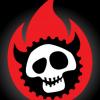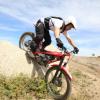-
Posts
335 -
Joined
-
Last visited
-
Hi Pat, a tip from doing a tonne of these over the years, you will need to replace the internal bearing that is in the crankcase that supports the kickstart shaft. The GasGas part number is MT2802260067. When this gets worn over time it allows the shaft to move at the furthurest part inboard, and this then cracks the case. If you dont change that it will happen again. There is a huge amount of stress on that bearing and they need replacing over time. It has a "blind" bottom , so it is like a cup. It can be knocked out easily with a drift from the left side of the bike - yes the LEFT side! If you look from the left side just below and behind the carby area on the crankcase right side you will see it's "bum". Once you remove the kickstart shaft you can knock it out to the right with a drift. You MUST do this when replacing the case. Jim Snell's old kickstart video is a help with the technique to get the shaft out: Jim's TXT Pro kickstart video
-
Hey Chappo, If you look in the original parts manual from GasGas it states C3 for the bearing.
-
Hey gasaxe You DO NOT need to split the cases. You do not need to remove the engine. You can check, and fix, this quite easily with just the removal of the clutch side cover and the clutch pack. Under the clutch pack you will see were the shift shaft comes right through into the clutch case. On the end of it you will find a top hat shaped piece and spring (see link below for image) https://www.thehellteam.com/gearbox-selector-spring-assy It is more than likely this is the only piece that will need replacing, but even if the shaft is damaged (less likely) from 2012 GG made the bikes so the shaft could be removed with the removal of a small retaining screw and washer, and the hole thing can be wiggled out the right hand side. If you are stuck please feel free to PM or email me for help. Paul. The Hell Team
-
The different "support rings" available from TRS (Soft , Medium and Hard) just change the amount of pre-load on the Belville Spring. Much like your pre load rings on your rear shock. But the Belville is still the stock 1.5mm thick spring. The Soft ring will reduce the pre-load, but it is not the only answer. The thickness of your five combined clutch plates affects this as well. So if your plates have swollen (this happens with some oils and over time) then there is more pre load on the spring. Conversely if the plates are under size compared to standard there is less pre-load on the spring. So this is why combined plate stack height is so important. These diapraghm clutches are fantastic because they can be tuned to suit the riders requirements, but you need to know exactly what you are doing, and it is extremelly fine measurements you are dealing with. If you have hand problems and really want that super easy light clutch, that does come with some compromises of course as the bite, or take up point, is also softer and less precise, then you can use a thinner Bellville Spring, but some other changes need to be made as well or you get bad slip. Here is a link to a kit with the super light spring and the other parts that compensate for that to give the lightest clutch possible. But first check your 5 plate thickness and make sure that has not crept towards or over 10mm. https://www.thehellteam.com/trrs-soft-clutch-kit
-
The water pump drive pin is a solid pin, rather than a hollow roll pin. The original GG part number is MT280218009 for the pin, and the original Waterpump shafts were MT280218006 - which was just the shaft with no pin, but then in 2004 GasGas updated the part so it was delivered with the pin, this was then part number MT280418006. So check your invoice, you must have been given one of the old 2002-2003 one without the pin.
-
If you go to The Hell Team's website (www.thehellteam.com) then go to TECH SUPPORT / GASGAS INFO then there is a folder called CHASSIS NUMBERS EXPLAINED with all that info, for all GasGas years. Tonnes of other good GasGas info there as well. Parts manuals, User manuals, service info, etc etc. https://www.thehellteam.com/technical-support/gas-gas-parts-and-service-manuals
-
I don't know the power rating, but there was a bigger road going head light available for them. Pretty sure we still have some in stock, that will give you much more p\output than the 'trial" version.
-
That is not an S3 part number, it is a TRS part number for the low compression insert used in the ONE R.
-
NO. S3 colour code their inserts: Yellow / Gold = Low Compression Silver / raw aluminium finish = stock compression Red is always the hi Comp variant.
-
S3 make two different high comp 300 inserts. One is for fitting a short BPMR6A plug as found on RR, R and ONE models, and one that takes the BPR5ES longer plug that is fitted to the GOLD model.
-
There is an S3 low plug type that takes the BPMR6A plug (stock plug) and fits the standard TRS head cover. https://www.thehellteam.com/trs-cylinder-head-insert
-
No, TRS still use this Caliper on all the ONE R models. The symptoms sound like you have no freeplay at the master cylinder. Check the actuating pin on the inside of the lever. It MUST have some freeplay and not be applying ANY PRESSURE on the Master Cylinder piston when the lever is in it's relaxed position. Use the jam nut (10mm wrench) to loosen the pin, wind it out until you get some freeplay (and hence allow the opening of the port hole between the pressure line and the reservoir), and then lock it again with the jam nut. Check you now have that little tiny bit of freeplay as you pull the lever in, and it should self bleed, and now allow the caliper pucks to open properly when you release the brakes. If it is still binding check your brake pad wear. As the pads get right down the piston pucks in the caliper can get a bit cocked and may bind in the bore. If this is the case take the brake caliper off the fork leg (leave the hose connected), remove the old pads. - The pads just need to be slid sideways into the centre and they drop out, no need to even touch the spring at the top. Then clean around toe pucks, push them back home, and install new pads. Reinstall caliper, a few pumps of the lever to get the pads against the discs, and you should be good to go.
-
I am a Reiger importer and service agent in Australia and you are correct that it does need a special tool / fitting to charge the shock (2 pieces actually). You can email me at The Hell team if you want some more information. TRS have only used R16V and Reiger shocks, they have not used Ohlins on any of their models. They use a number of different Reiger models. The ones on the ONE R have adjustable compression and rebound, and use a clevis connection at the lower end. The RR models have hi and low speed compression adjustment, and rebound adjustment, and a clevis connection at the lower end. And the GOLD series use the bigger bodied B40 shock with hi and low speed compression adjustment, rebound adjustment and Hydrastop adjustment, and a spherical bearing connection at the lower end. The Ohlins on the GG has spherical bearing connections both ends, and is a slightly different free length. TRS 265mm, GG 279mm, so not compatible. (at least not without some work and parts replacement). And the Ohlins is no were near as good as the Reiger (even the base model) IMHO.






